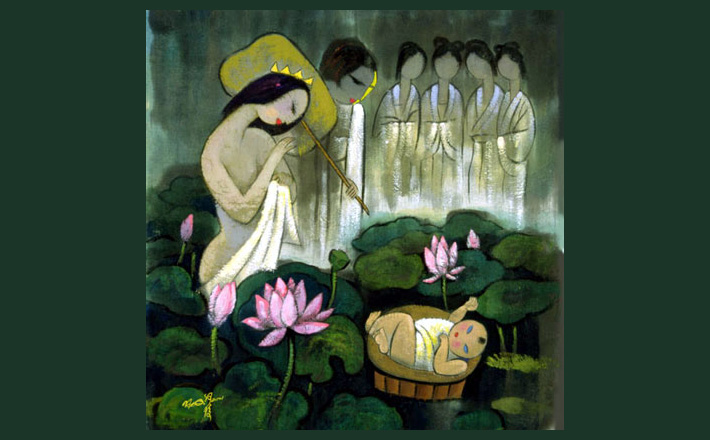Commentary on Exodus 1:8—2:10
Opening lines in Hebrew narratives are loaded with meaning, but they can be easy to overlook.
Hebrew is such an economical language that just a few words can convey meaning far beyond what their brevity might suggest. In Genesis 34, for example, in the story about Jacob’s daughter Dinah, the chapter begins with just two words in Hebrew, translated as “Then Dinah went out.” I can just imagine the ancient Hebrew-speaking audience thinking, “Uh-oh, nothing good can come from a young woman going out on her own.” And they are right, because the story is a tragic one in which violence builds upon violence and Dinah is never discussed again.
The opening line of the Exodus story begins with similarly ominous foreshadowing, again with just two Hebrew words, translated: “Now a new king arose …” In the story immediately preceding this one, the Jacob cycle concluded in Genesis 50 with Joseph and his brothers having fully reconciled with each other and they and their families residing comfortably in Egypt. With just three words this time, the author lets the audience know that the story is about to take a turn.
How will this new king treat Jacob’s descendants — immigrants who have contributed to and made their home in Egyptian society? Just in case we don’t catch the foreshadowing, the author adds that this is a king “who did not know Joseph.” The verb “know” in this case can’t be read literally because generations have passed. What it’s getting at in Exodus 1:8 is that the new king didn’t remember Joseph’s role in keeping the Egyptians alive during a time of famine or simply chose to ignore this piece of history. In any case, it seems to be more willful than a simple act of forgetting.
We don’t have to wait long to find out what this means for the Israelite immigrant population. The Pharaoh says:
Look, the Israelite people are more numerous and more powerful than we. Come, let us deal shrewdly with them, or they will increase and, in the event of war, join our enemies and fight against us and escape from the land (Exodus 1:9-10).
What’s interesting about the king’s assessment of the Israelites in verse 9 is simply not true — the Israelites have not grown more populous than the Egyptians. And what he says in verse 10, further compounding his false statement, is a clear strategy to create an “enemy within” and to stir up fear of the foreign or immigrant other. The Pharaoh then wastes no time in putting a plan together to deal with this dangerous element in their midst.
Oppression and murder
Look at what happens to the Israelites in verses 9-14, and notice the language that is used to describe their circumstances. The repetition of forms the words and phrases having to do with oppression, ruthless treatment, forced labor, and imposed tasks is striking. The sentence in verse 14 sums up what has happened: The Egyptians “made their lives bitter with hard service.”
If working the Israelite population into the ground is not enough, the Pharaoh takes a further step to ensure the ultimate destruction of the Israelites. He asks the Hebrew midwives to kill every baby boy that they deliver to Hebrew mothers. At this point, though, the beginnings of resistance to the Egyptian Pharaoh emerge.
The midwives refuse to do what the king has commanded and when the Pharaoh asks them why they are not killing the baby boys, the midwives respond by playing to his own stereotypes about immigrants and their breeding habits. “Because the Hebrew women are not like the Egyptian women; for they are vigorous and give birth before the midwife comes to them,” they say. When the Pharoah sees that he won’t be able to convince the Israelites to kill their own children, he turns to the Egyptian population, telling them to throw the baby boys into the Nile River.
Resistance and creation
The resistance doesn’t end with the midwives, though. Moses’ own mother figures out a way to save her baby from being killed by first hiding the child and then by putting him into a basket in the river. There appear to be allusions in Exodus 2:2-3 to both the creation and the flood in the early chapters of Genesis. While the NRSV translates the phrase in verse 2 as “and when she saw that he was a fine baby,” the Hebrew uses same language that is used about creation in Genesis 1, where, at each stage of creation, the refrain reads, “And God saw that it was good.” Ex. 2:2 could just as easily read, “The woman conceived and bore a son; and when she saw that he was good …”
In Exodus 2:3, although the NRSV uses the English word “basket” to describe the container into which Moses was placed, the word in Hebrew is the same as the one that is used for “ark” in the Noah story. With just two phrases, the beginning of Exodus incorporates the story of the creation of the world into the story about the creation of the Israelites as a people (no longer just a family or clan) which unfolds throughout the entire book.
The resistance continues
Women continue to resist in the remainder of the passage. Moses’ sister escorts the little ark which contains the baby who will rescue the people of Israel down the Nile River. Although the text says that Moses’ sister “stood at a distance, to see what would happen to him,” I imagine that her role was somewhat more active. It seems that her job is to make sure that the right person finds the child. When Moses’ mother puts the child on the Nile, she must know that the Pharaoh’s palace lies just downriver, making her action more strategic and even more daring. After all, for this baby to survive, not just anyone can find him.
And what’s amazing is that this strategy works! His little ark floats right into the hands of the Pharaoh’s daughter who rescues him even though she immediately recognizes him as a Hebrew child. Moses’ sister “just happens” to be nearby and knows exactly where to find a woman who can nurse the baby — Moses’ own mother. To top it off, the Pharaoh’s daughter pays Moses’ mother to nurse the baby.
In this chain of resistance that is executed exclusively by women, both Israelite and Egyptian, the Pharaoh’s plans are subverted and the Israelites survive.


August 27, 2017